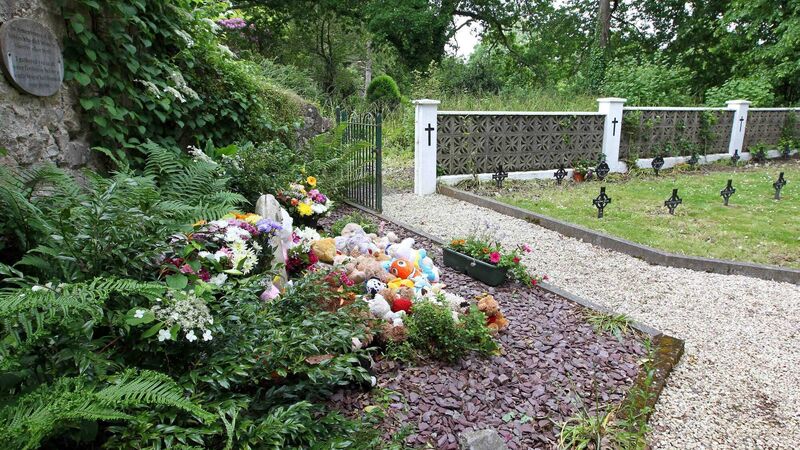Minister defends plans to seal Mother and Baby Home records for 30 years

The Little Angels Plot in Bessborough.
The Minister for Children has defended plans to seal records relating to the Commission of Investigation into Mother and Baby Homes for 30 years, saying it was to protect "a really valuable asset" while also stressing the need to address "legacy issues".
The Mother and Baby Homes Commission is due to publish the findings of its five-year investigation on October 30 next, with Minister Roderic O'Gorman saying it will be a huge work of more than 4,000 pages that will span a 75-year timeframe.
He said it would also include a chapter in which those who experienced the Mother and Baby Homes will be able to describe - in their own anonymised words - their experiences.
The Commission of Investigation (Mother and Baby Homes and Certain Related Matters) Records Bill 2020 is set to be discussed in the Seanad this week, with the MBHC saying that due to the 2004 Commissions of Investigation Act under which it was founded, the confidentiality principle meant that the archive had to be redacted.
With the Commission itself due to dissolve on publication of its report, it has meant a rush to legislate to have the records sealed, amid fears that otherwise it could result in an incomplete archive and limiting its usefulness when it came to information and tracing.
The proposal to seal the archive has prompted criticism and opposition from the Justice for Magdalenes group and the Adoption Rights Alliance, while on Wednesday Aitheantas, the Adoptee Identity Rights and Cork Survivors and Supporters Alliance, stressed its opposition to the sealing of administrative files and the transfer of files relating to the Commission of Investigation into Mother and Baby Homes and Certain Related Matters to Tusla.
Maree Ryan O’Brien of Aitheantas said: "An archive at this juncture only further objectifies adoptees, birth parents and survivors as a subject matter of the same, as being a commodity in terms of the value of the information in our files. Paper not people, without any provision for any other much needed and long-absent supports.
"There needs to be a balance in this Bill allowing for those who gave testimony and wish it to be preserved and accessible, with those who wish to have their testimony destroyed or sealed. The wishes of survivors who were promised that their testimony would be destroyed must be respected."
Speaking to the media at a Budget briefing during which he outlined spending plans within his Department, Minister for Children Roderic O'Gorman said while he would have preferred not to have to rush such legislation, he did feel it was the correct course of action.
"We are trying to protect a really valuable asset," he said of the archive.
The Minister said under the 2004 Act the Commission said it would have to redact the records, "and that would have the consequence of rendering the database useless".
An alternative is to seal for a time, with the Minister stating that the archive has "real potential", but this would only be fully realised if the information and tracing legislation was also put in place.
He said he could understand people's scepticism but he was committed to addressing legacy issues around Mother and Baby Homes, Tuam and information and tracing.
"The legislation that I am looking to bring forward, [is] information and tracing legislation to allow clear pathways for those who were adopted get information on their early life and to make it as broad as possible," he said, adding that this would include "their birth and the circumstances of their parents".
"That is what we are going to seek to achieve," he said.
The Minister admitted there were some "constitutional constraints there but we will try and vindicate their rights".
Earlier, the Dáil heard the Mother and Baby Homes Records Bill 2020 needs to be scrapped.
Sinn Féin president Mary Lou McDonald said Mr O'Gorman is "doing the wrong thing" and "causing alarm" by bringing the legislation forward.
"This will prevent people from accessing their records from the minister's archive, and it will stop families from accessing information about disappeared family members or babies buried in unmarked graves. I'm sure you would agree that this is very wrong," she said.
She called for an anonymised index of the records held and said the minister must consult with survivors and their advocates, and then draft the appropriate legislation which would meet "the needs and rights of survivors and to the moral obligations of the State".
Ms McDonald said: "What happened to women and children behind the high walls of Ireland's mother and baby homes casts a long and a dark shadow. For decades, these homes were shrouded in secrecy.
"Those who survived those institutions, those who didn't survive and their families are entitled to justice, and they're entitled to the truth."
Responding, the Taoiseach said redacting information would effectively destroy the database.
"In advancing the legislation today we're ensuring that an incredibly valuable and useful set of data can be used into the future, and can support that essential information and tracing component that otherwise would be lost," Micheál Martin told the Dáil.
Mr Martin said that the motivation behind the legislation is "genuine" and "positive".





